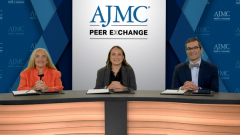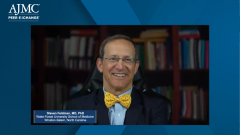
Adherence with the Help of Parents or Caregivers
An overview on the current role of caregivers on patient adherence.
Episodes in this series

Casey Butrus, PharmD: [Dr Feldman], I know we were previously talking about adherence and how that’s crucial for patients to achieve clear skin. And I know you also mentioned you thought it would be nice for health plans to focus on adherence too. I know some health plans do have case management teams that focus on conditions related to stars like hypertension, diabetes, and hyperlipidemia. I think it would be great if acne or other dermatological specialty conditions could be integrated into case management too. What are some clinical pearls that you can offer to make sure optimal medication is adhered to?
Steven Feldman, MD, PhD: That very tight social interaction that you would get from a care team would have a dramatic improvement in adherence. I think the main reason patients aren’t using the medicine is because doctors like me are doing a really bad job of getting people to use medicines. We’d write a prescription and then tell people to come back in 2 or 3 months. If a piano teacher said, “Here’s a prescription for some sheet music, practice every day, I’ll see the recital in 2 or 3 months,” nobody would expect that recital to sound very good without weekly lessons that force people to practice. And I think a lot of us doctors are like a piano teacher says, “Here’s a prescription for some sheet music. Take it to the sheet music store. I don’t know what it’s going to cost, or whether your insurance is going to pay for it or not. I want you to practice every day. We’re not going to have weekly lessons, you just practice every day. But know that practicing may cause rashes, diarrhea, and possibly serious adverse effects. I’ll see you at the recital in 2 or 3 months. And if the recital doesn’t sound good, we’ll give you 2 or 3 other musical instruments to practice at the same time.” [It’s] crazy what we’ve been doing. I think you have to create that. You can take the most industrious, most driven people with the greatest desire for success and tell them, "Here, do this every day, I’ll see you in 3 months." I wouldn’t do that with medical students who wanted a dermatology residency. And they’re incredibly effective people, but if they came to work with me for the summer, I’m going to have a lab meeting with them once a week to make them work. I’m not going to tell them, “Do this every day, see you in 3 months.” It’s just crazy the stuff we’ve been doing. So I think making sure patients trust us [is important]. And I think most doctors come across as trustworthy, but creating that sense of accountability is critical. Because we often tell people to come back in 2 or 3 months or come back if they need us. It’s just ridiculous how little accountability there is. I can get people to use their medicine just by giving them a return appointment in a week or by saying, “I’ll see you back in a week.” No way. Gosh, then you’re going to have another co-pay. Tell you what, here’s my cell phone number, you call me in a week. That forces them to fill the prescription and use the medicine much better than they would otherwise. And if I was running our health system, man. If the EMR [electronic medical records] saw a prescription for a new medicine, a message would go out to the patient through the portal at the time the prescription was written with a picture of the doctor or maybe a short video of the doctor who wrote that prescription saying, “I care deeply about you. I want to know if this new medicine is working for you. So please send me a message through the portal. Or we’re going to check back with you through the portal in 1 week to find out how you’re doing.” That would cost nothing except for a few electrons and would create a sense of accountability that would drive people to use their medicine. Then after you’ve established that foundation, giving people treatments that are accessible in terms of cost is good. And maybe once you’ve established that foundation, the reminders, written instructions, addressing adverse effects, making sure the treatment’s not too complicated, all the stuff they teach us in medical school may add a little bit of benefit. But if you don’t have that foundation of accountability, I don’t think the reminders, written instructions, addressing the adverse effects, motivational interviewing, and keeping it simple is going to solve the problem. Because if a piano teacher didn’t have weekly lessons but gave people reminders and written instructions and addressed adverse effects and made it easy, the recital’s still going to sound horrible.
Casey Butrus, PharmD: I agree with the accountability. I think also having the shared decision-making between the provider and the patient to make sure they’re on board with the treatment plan is really important too. Do you envision adherence with caregivers, since I know this patient population can be younger, [and] how do you have that accountability with the caregivers as well as the adolescent patients?
Steven Feldman, MD, PhD: We did one study some years ago with a topical agent to be applied once a day, and we divided the adolescents into 4 groups. One, we just told them to come back in 6 weeks and 12 weeks. And they didn’t use the medicine very well. Another group, we told them, come back in 1 week, 2 weeks, 4 weeks, 6 weeks, 8 weeks, and 12 weeks. And then those kids use their medicines better. And that’s not surprising. I think the term for this is white coat compliance, but I like to call it the dental floss phenomenon, because when do people floss? Right before they go to the dentist. The visits really drive people to use their medicine. In a third group, we used reminders; we called the kids to get them to use their medicine. That didn’t help. In the fourth group, we called their parents every day and we told the parents every day, don’t forget, remind your child to use the medicine. And those teenagers used the medicine less than any of the other groups. So parental reminders, when it comes to my involvement with caregivers, I tell caregivers, “Hey, worry about alcohol and drugs. Let’s let this kid be in charge of their own acne medicine.” But I also give the caregiver my cell phone number and let them know if there are any questions or problems, any trouble getting the medicine just to reach out to me directly.
Casey Butrus, PharmD: Thinking back to my childhood, if my parent was telling me to do something every day, that would probably be the thing I would least listen to. So I agree, having multiple mechanisms and talking to the patient directly, making them feel like they’re part of this treatment plan, I think is really important as well.
Transcript edited for clarity.
Newsletter
Stay ahead of policy, cost, and value—subscribe to AJMC for expert insights at the intersection of clinical care and health economics.











